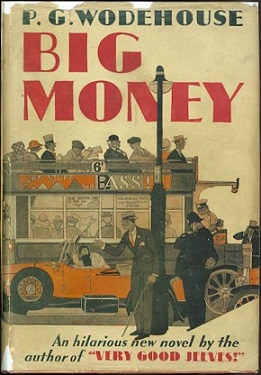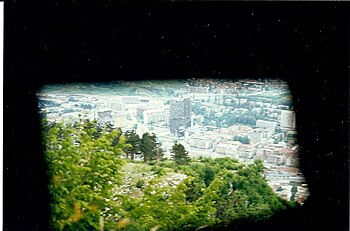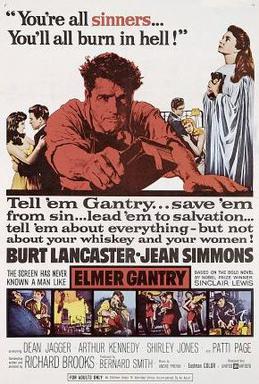 |
| Elmer Gantry (film) (Photo credit: Wikipedia) |
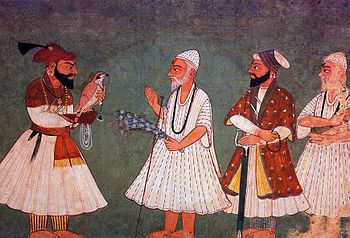 |
| Guru Gobind Singh (with bird) encounters Guru Nanak Dev. An 18th century painting of an imaginary meeting. (Photo credit: Wikipedia) |
 |
| Guru Har Rai ji. Painting by Amolak Singh. (Photo credit: Wikipedia) |
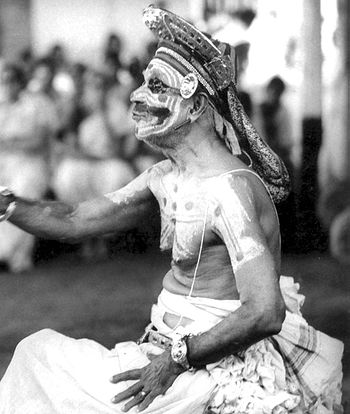 |
| Natyacharya Vidushakaratnam Padmasree Mani Madhava Chakyar performing Chakyarkoothu. (Photo credit: Wikipedia) |
 |
| Guru-prasada Swami speaks at Bhakti Tirtha Swami's Vyasa Puja in Mayapur, West Bengal, India (Photo credit: Wikipedia) |
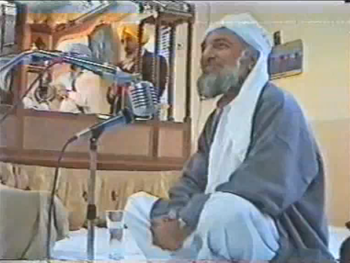 |
| His Holiness Riaz Ahmed Gohar Shahi blessing a Sikh audience in a Guru Nanak Gurdwara, Phoenix Arizona, USA (Photo credit: Wikipedia) |
 |
| English: Birth Place of Guru Govind Singh (Photo credit: Wikipedia) |
I saw a most amazing documentary movie yesterday called Kumaré, which is available on the
American Netflix.
Made by a young man called Vikram Gandhi, of Indian
descent, but himself born in New Jersey, he tells the story of how he went to
Phoenix, Arizona, ran into a number of cults, each with their phony guru, decided
to make a film about gurus, and said to himself, he should go to India to see
the real thing. He did go, and it was worse! The gurus in India were more, and
more phony, than in the US of A. So, returning home, he had a wonderful idea.
He would himself become a guru, invent his own cult, and see how it went.
He grew his hair down his back,
his beard down his front, got the Indian dress and phony accent, and set
himself up in business, talking that simplified, incorrect English to which we
have become accustomed in the American-centred Indian guru of fairly recent
fame.
He took along to Phoenix with him
two girl followers, one to book dates, and the other to spread the word. He
wangled an invitation to some sort of Yoga conference, where his supporter told
a small audience, that Kumaré meant Divine Child, and, quoting from what she said
was the Kumaré Sutra, Chapter 3, Section 12, that the “seeker who finds a
teacher, finds himself with the milk of wisdom like a child at the mother’s
teat.”
Soon he had a small group of
followers, whom he had no difficulty in persuading to chant his own personal
chant --- U Wa é, a meaningless chant
--- and he began to pedal his own version of the path to nirvana. He
said he “holds up the mirror for you, not literally, but metaphorically,” and grasping
for some message in which to wrap his deception, he said he saw himself in
other people. Some of those to whom he
first peddled this rubbish said they found “there is something about him that
is truly unique,” and others said they would like to spend more time with
him. Over the weeks that followed, he
developed his schtick, inventing what he called Blue Light meditation, which put
some of them into such paroxysms of ecstacy that they saw him “bathed in a
white light that clung to him all over.’ He told them he came from Halikash,
and when they couldn’t find it on a map, he indicated a location in India, and
said, “we don’t like to advertise its location too much.” Another woman said she was getting warmer in
his presence, “and I am sure that’s your energy.”
He had learned some yoga before
embarking, and now he invented fake yoga moves that he passed on to his followers,
as he began to ask them if they had seen a Vikrama? Since it was just something he had made up on
the spur of the moment, he was not surprised no one had seen it. One young
woman who had a husband confessed to him she didn't even believe in marriage,
that now she was free to go with the flow, to be blown with the wind, and what
would he advise? In commentary Vikram said that in a moment of honesty he
didn’t feel in any position to advise her about anything; but she disappeared to California soon after, presumably leaving husband behind.
He wondered how his
followers would get on in his absence,
and accepted an invitation from some sort of spiritual guru in Tucson, who, it
turned out, based his whole teaching on the phrase, “in the beginning was the
word,” his interpretation being that “the word” implied sound, so his teaching
was based on everyone bringing out their personal sound. “I found that the power
of illusion was greater in Tucson than I had ever imagined,” said the
commentary. He had invented his own sign to paint on the forehead of his
followers, and called it a Pinasignore. But when he returned to find his
followers already felt like they were experiencing Blue Light meditation and
chanting “U-Wa-é” over and over, he said he almost began to believe in his role
as a guru himself. He thought he had better deepen his message, so he began to
tell them, “I am a fake, no one needs a guru, your guru is inside you, everyone
is his own guru,” a message that they began to embrace because of the intense
spirituality with which he invested it.
Invited to a Yoga centre near the
Mexican border, kept by a guru called Gabriel, he discovered the followers
there believed they were each from a different planet, and that they called the
planet they were on for the moment Urantia. He discovered this centre had been
investigated by a TV channel, which raised questions about their having
detached people from their money. “But all I saw were a group of environmentalists,
people who were removing themselves from the pain of American life,” Vikram
said, in commentary. Gabriel told him he had been taken aboard an alien craft,
whose operators had wiped it out of his memory for years, revealing the memory
only later, leaving him with “a mandate of the bright and morning star.” (This reminded me of the phony evangelist in Sinclair Lewis’s novel Elmer Gantry, whose
mantra was, “and what is faith? Faith is the evenin’ and the mornin’ star.”)
Back among his followers, he
began to philosophize about their space, saying their yoga spaces outside were
not real, that they had settled “in this sacred space”, (indicating the hall
they were sitting in), and that “you do not need it. You have your yoga centre
inside of you.” One of his followers, a teacher, organized a concert in his
honour, and said that she considered Kumaré “a living embodiment of the
divine.” Another group which invited him to visit was run by a little fat chap
who called his discipline the Law of
Attraction. Everyone created his or her own vision board, and on the mantra,
“One, two, three”, everyone shouted “Kaboom,” thus proving how happy they all
were. When Vikram returned from all this, one disciple said, “I couldn’t get
him out of my mind,”; another “he’s a doctor, that’s what he is”; and a third,
that he was a mirror who allowed people to look inside themselves. Unphased by
Kumaré’s frequent insistence that he was a fake, one disciple said, “today I
embrace illusion to find faith.”
In commentary Vikram said: “I
wanted to teach my students that they could help themselves, they never needed
a guru in the first place.” He sat them around a pool, had them light little
candles on small dishes which they
embarked on the water. “Look at your candle,” he intoned. “It is a reflection
of your inner light.”
Eventually, after a 40 day absence,
he staged a ceremony called The Great Unveiling, in which he intended to expose
his fraud to them, after they had, themselves, searching their inner guru,
exposed their own desires for themselves.
But Kumaré/Vikram tried, and could not utter the words he needed.
So, he retired again, and a week later had his two women helpers convene his
followers for a last session. Meantime he shaved off his beard, cut his hair,
took to wearing jeans and shirt, and dropped his phony accent. Then he walked
casually into the room to face them all, stood looking at them for a few
moments, and said, “I am Vikram. I am not a guru. I am an American citizen,
like you. I was born in New Jersey.”
There was a stunned silence, for
perhaps a minute before someone started to applaud, an applause joined by most
of them. Two or three of the younger women got up and rushed outside, never to
be seen again.
The film was over, having told us
as much as anyone needs to know about religion, and messages on the screen
record that of 14 besotted followers, 10 were still in touch with him, still
believed in him and thanked him for the inspiration and change he brought to
their lives.
An amazing movie, no matter how
you look at it.

